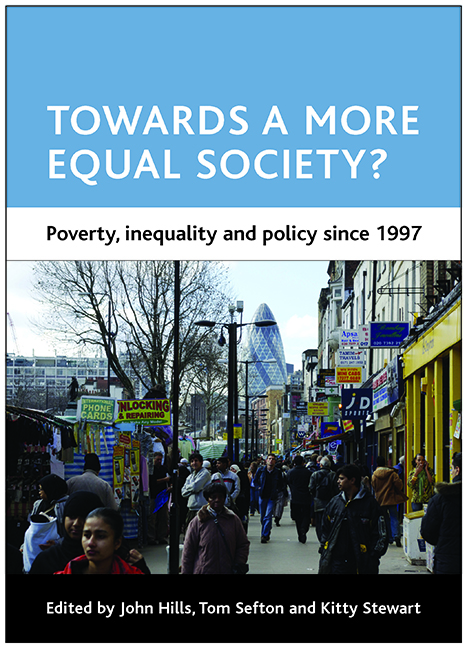fifteen - Future pressures: intergenerational links, wealth, demography and sustainability
Published online by Cambridge University Press: 22 January 2022
Summary
Having surveyed the last decade, it is natural to contemplate how things might change in the future. This is not to forecast inequality. A glance back at Figure 2.1 in Chapter Two shows significant turning points in income inequality that would not necessarily have been foreseen. In 1970, following comparatively little change since the Second World War, the drop in income inequality to an all-time low on the measures shown by the late 1970s would not necessarily have been predicted. When the Royal Commission on the Distribution of Income and Wealth produced its final reports (1979a, 1979b), the data available reflected that all-time low, with no indication of the massive leap that was to come through the 1980s. Equally, the Joseph Rowntree Foundation's Inquiry into Income and Wealth reported in 1995 (Barclay, 1995), with data available reflecting the growth to the high point of inequality in the early 1990s, but preceding the fluctuations around a more stable level since.
This warns against simple extrapolation. What happens to income inequality results from a complex mix of factors including labour market structure; returns to different levels and kinds of skill; international trade and technological change; partnership patterns; regional and neighbourhood differences; and – as the rest of the book has shown – policies adopted by governments. Without a crystal ball, we cannot predict whether we are approaching – or have already passed – some new turning point.
However, it is possible to identify some major factors that will affect income distribution, and where the pressures could differ from the past decade. This chapter considers four: intergenerational transmission of advantage; wealth and inheritance; demographic change and pressures on the public finances; and environmental sustainability, specifically the need to reduce carbon emissions in the face of climate change.
Intergenerational transmission of advantage
Whether the objective is equality of opportunity, or more equal outcomes, either is harder to achieve, the more life chances are determined by birth. Policy debate in the last decade has emphasised the former, and has put as a positive achievement, the creation of a more ‘meritocratic’ society (sometimes oblivious that Michael Young's 1958 book that coined the term – The Rise of the Meritocracy – was a satire, by the end of which some of the ‘meritocrats’ attempted to cement the social position of their children).
- Type
- Chapter
- Information
- Towards a More Equal Society?Poverty, Inequality and Policy since 1997, pp. 319 - 340Publisher: Bristol University PressPrint publication year: 2009



